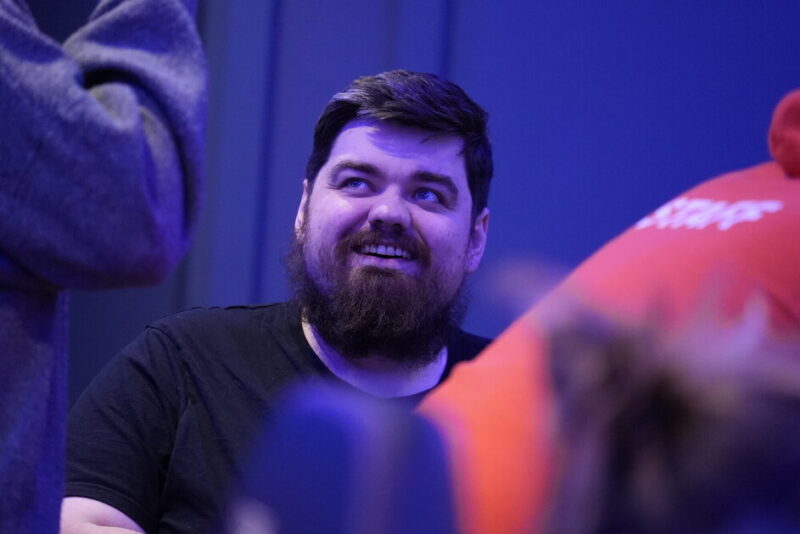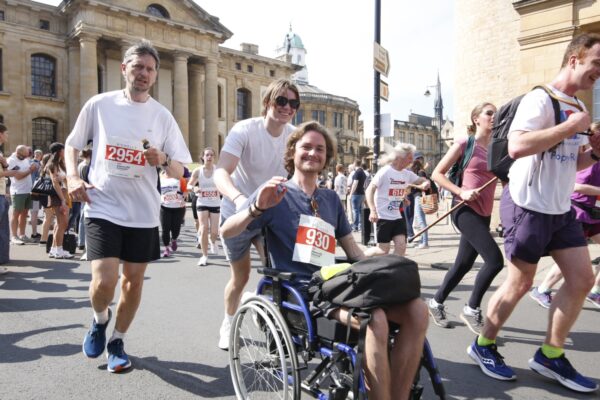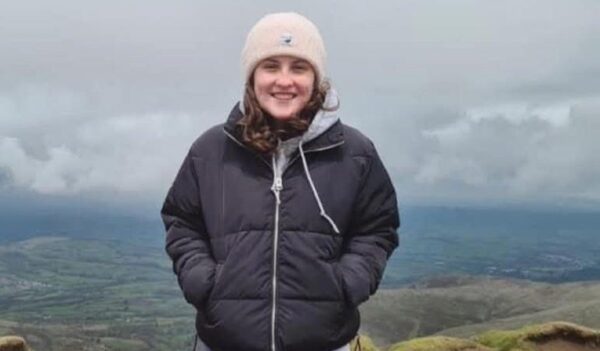Alongside being a busy housekeeper and a doting mum to six-year-old Daisy, Gemma is a keen runner who’s taking on the AJ Bell Great North Run 2023 to raise money for MDUK. It’s a cause that’s deeply important to the 35-year-old; not only did her late dad have myotonic dystrophy, it’s a condition that she and her brother have lived with since birth.
Going the distance for muscular dystrophy research at the Great North Run 2023
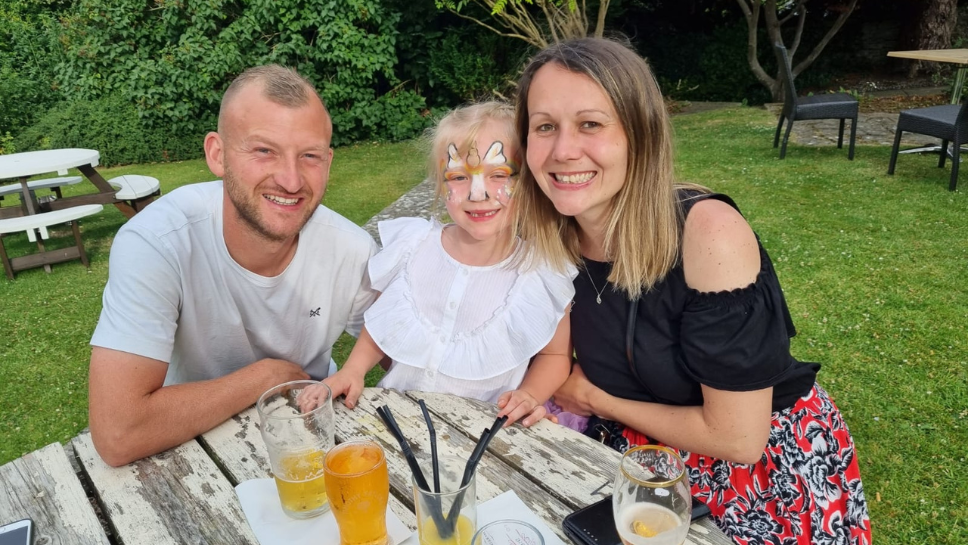
I remember the first time I ran the Great North Run, back in 2021.
I was coming up to a bridge where people had lined up to cheer on the runners. Someone must’ve seen my name written on my shirt, because I suddenly heard this voice from up above shouting, “Go on, Gemma!”
The whole day was such a buzz, but it was also quite an emotionally overwhelming experience. As you were running, you saw people with messages or names across their backs and you realised everyone’s doing it for their own reasons.
That’ll be me this year, joining #TeamOrange running team and taking part in the Great North Run to support MDUK – and in memory of my beloved dad.
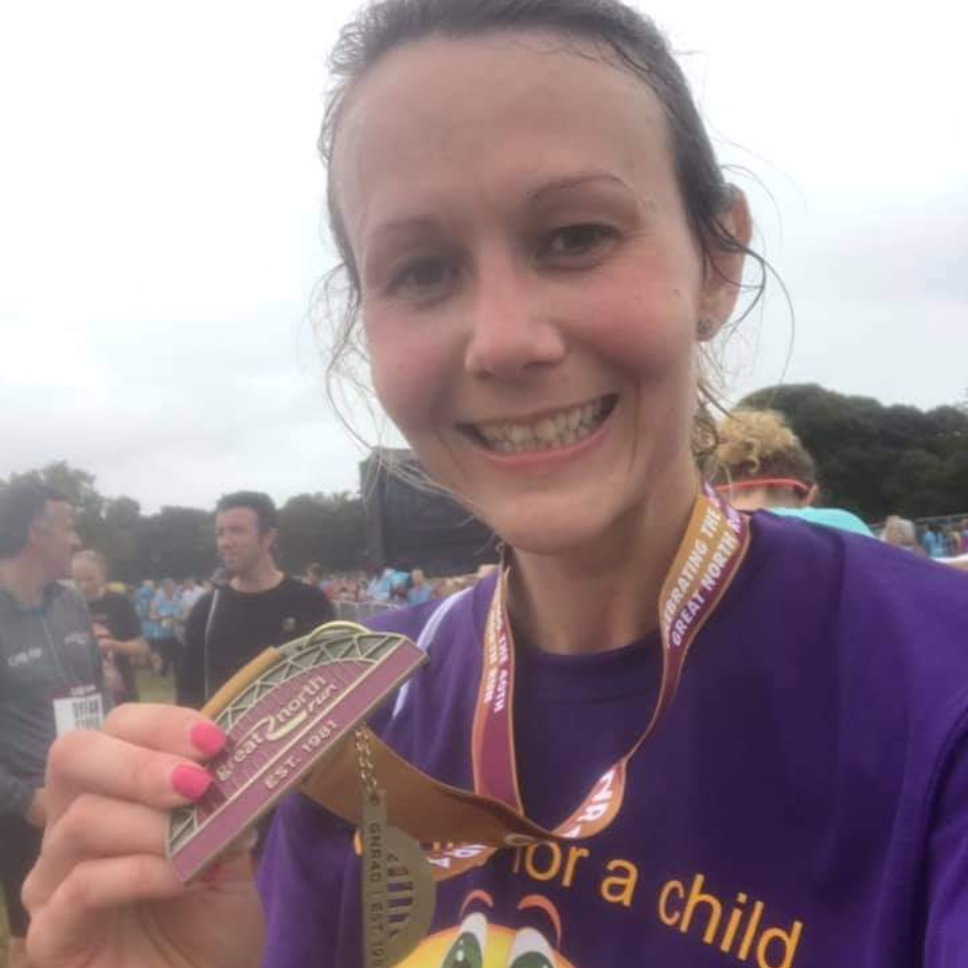
Being diagnosed with myotonic dystrophy despite having no symptoms
I was diagnosed with myotonic dystrophy – a genetic condition that causes progressive muscle weakness and wasting – when I was 16 years old.
Although it’s a progressive condition, I still don’t have any symptoms even years after my diagnosis. I go for annual check-ups with the consultant and while I haven’t experienced symptoms so far, they’ve advised me that I’ll probably need a pacemaker at some point in my life.
We originally found out that I have it because it’s a condition that can be passed down through families; my dad, John, had the condition and one of my brothers has it, too. It’s hard to deal with, but you just get on with it; living with the knowledge becomes the norm, I suppose.
“Living with myotonic dystrophy is more of a mental battle for me”
My dad passed away from complications relating to his condition when he was 54, but he didn’t really have any symptoms till his mid-30s. He began to have mobility issues, experienced excessive sleepiness, and struggled with speech because of muscle wastage.
I remember my dad was always very athletic. He played table tennis, he was into football, and he was a bit of a thrill-seeker; he was always the one who’d come on the rollercoaster rides with us when we were children.
I was still a child when his health began to deteriorate and when I think back now, I don’t think I realised what was really happening. I know my parents did their best to protect me from the worst of it.
Over the years, Dad went from being his typical active self to using a wheelchair. He began to lose his speech and experienced other difficulties with his muscles and motor functions. I was 26 years old when he sadly passed away.
Because I saw what my dad went through and I know he didn’t have any symptoms until he was in his mid-thirties, living with myotonic dystrophy is more of a mental battle for me.
None of us know what the future holds. But I do know I’ve got this condition. It might never progress – and hopefully it won’t – but I can never be sure. It’s constantly in the back of my mind.
Using pre-implantation diagnosis to screen for myotonic dystrophy
Despite everything, I do consider myself lucky – because unlike many people living with the condition, I know that I have myotonic dystrophy.
It meant when it came to having a baby, we could take steps to ensure the condition wasn’t passed down to my child. That’s why I underwent pre-implantation gene diagnosis (PGD) to have our daughter, Daisy.
With PGD, the doctors identify the gene for myotonic dystrophy by analysing samples from me and my family. Then, you go through a normal cycle of IVF but when your eggs are fertilised, the doctors have a look and see which eggs have the gene and retain only the eggs that don’t.
Through the PGD process, we were left with three eggs that did not have the gene for myotonic dystrophy.
I feel completely blessed that I’ve got a little girl who is healthy – and thankfully, I remained healthy too.
The clinic identified the strongest egg out of the three and thankfully, we were able to use that egg to become pregnant and have Daisy.
As a procedure, it wasn’t without risk. When someone who has myotonic dystrophy but doesn’t have symptoms becomes pregnant, it’s quite common for them to start experiencing symptoms during pregnancy. In some cases, their health can continue to deteriorate.
I feel completely blessed that I’ve got a little girl who is healthy, and that thankfully, I remained healthy too. While we kept the two remaining eggs frozen for a while, eventually, we decided to let them go; we wouldn’t risk trying to have another child.
The anger in finding out you have a genetic condition
Having Daisy and being able to ensure that she wouldn’t inherit myotonic dystrophy has been wonderful. It’s also made me reflect on my dad’s experience of being a father and living with the condition.
When my dad was still alive, he and I went along to a local myotonic dystrophy gathering . I remember being sat around the table and someone asking my dad “If you knew you had this condition and you were going to pass it on to your children, would you still have had children?”
To this day, I still remember him saying “I’m not sure I would.” I thought “Oh, I completely understand why he said that” – and I still do. If he knew about his condition before becoming a father, he probably would have considered whether we wanted to have children.
I’ve been to conferences ran by myotonic dystrophy support groups, and I know that a lot of people who have the condition can feel really angry about this. Because they didn’t have symptoms, they didn’t know they had the condition and they unknowingly passed it on to their children.
They can feel very angry in that situation, and it’s a feeling I can appreciate because it’s something my dad struggled with in some ways.
“As far as I’m concerned, I’ve stopped myotonic dystrophy in our family”
That experience is why I consider myself lucky for knowing I have the condition. As far as I’m concerned, I’ve stopped myotonic dystrophy in our family.
I have two brothers; Kevin and Dale. Kevin has myotonic dystrophy, but he has no intention of having children. Dale doesn’t have the condition, so his children haven’t inherited it.
And because my partner and I went through pre-implantation gene diagnosis, we know that Daisy doesn’t have the condition, either. This means that if she or her cousins ever have children of their own, they won’t be passing the genetic condition down to their children.
Just knowing that Kevin and I will probably be the last people in my immediate family to have the condition is an amazing feeling and it fills me with so much joy that my family most likely won’t have this condition anymore.
Running for MDUK – and for myself
All in all, I try to keep a positive outlook on life.
I think about all the things I want to continue to do with my daughter. We live out in the country, so our days are filled with bringing the logs in, walking through the fields, climbing fences, and being out and about with my partner, who’s a game-keeper.
I love my active lifestyle. And we are very lucky, I know we are, but I just don’t want to deteriorate. I don’t want to let the condition win. Daisy’s six now and sometimes I catch myself thinking, “by the time she’s ten, will I be in a wheelchair?”.
It’s hard, but I try and have a focus and keep my fitness up. That’s one of the reasons I signed up for the Great North Run in September for MDUK. Life’s really busy at the moment but I’m still trying to get out for a run a couple of times a week – and I’ve got some fundraising plans in the pipeline, too.
I want to help fund all they do to support people like my family, who are living with progressive muscle-wasting conditions.
But I’ll also be doing it for me – and whatever the future holds.
If you’d like to support Gemma in her efforts to raise money for MDUK, you can visit her fundraising page and leave her a message of encouragement. Or you can join Gemma on the starting line by signing up for the Great North Run and running to help us show the world just how much #MusclesMatter.
